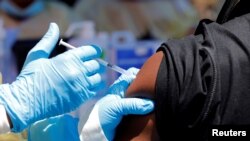The World Health Organization reports progress in containing the Ebola outbreak in the eastern Democratic Republic of Congo, but says many challenges to its elimination remain. WHO reports the number of cases in the outbreak now stands at 3,207, including 2,144 deaths.
The executive Director of WHO Health Emergencies, Michael Ryan, says he is largely optimistic that aid workers are getting control of the Ebola outbreak in eastern Congo. But, he says, it is impossible to say the outbreak is over.
“It is not. It is impossible to predict where the outbreak is going to go next," said Ryan. "But… I do--I would stand over the fact that we have significantly contained the virus in a much smaller geographic area. Now we have to kill the virus. The problem is, it is back in areas that are deeply insecure.”
In fact, the virus has come full circle. Ryan notes the disease has moved from Butembo and other urban areas to the remote, rural town of Mangina, the epicenter of the outbreak. He says the virus is back where it began when the Ebola outbreak was declared August 1, 2018.
“So, essentially the virus is back in the same zone," said Ryan. "So, the factors that allowed that virus to transmit at low intensity for a number of months, have not changed. Deep insecurity, reticence amongst the population, distrust and many other factors continue to make this a very dangerous situation. But a situation, for which I believe we are making significant progress at this time.”
Ryan says WHO is increasing the scale of its operation, engaging in active surveillance across North Kivu province and actively seeking new cases and tracing contacts to keep the virus from spreading.
He says more than 230,000 people have been vaccinated against the deadly disease and more lives are being saved among people infected with the virus who are coming to the treatment centers.
He says the fatality rate among the nearly 800 patients currently in Ebola treatment units is less than one third – a significantly better outcome than the two-thirds fatality rate reported for the disease overall.
Still, this is the biggest Ebola outbreak in Africa since the epidemic across three West African countries in 2014 killed more than 11,000 people.




